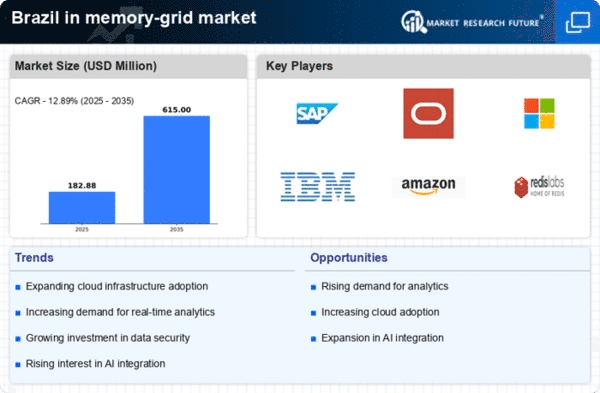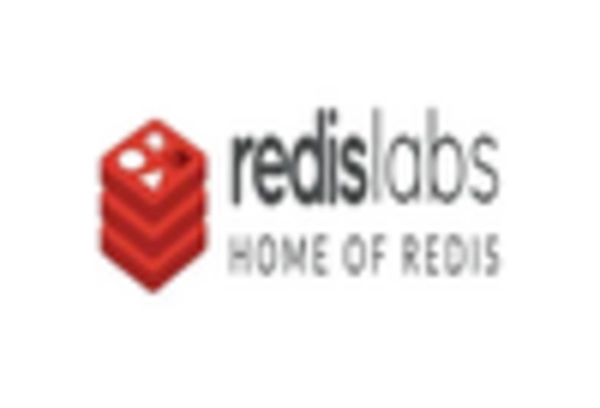Surge in Data Generation
The exponential increase in data generation across various sectors in Brazil serves as a crucial driver for the in memory-grid market. With the rise of IoT devices, social media, and digital transactions, it is projected that data creation will reach 175 zettabytes by 2025. This surge necessitates advanced data processing capabilities, which in memory-grid solutions provide by enabling real-time analytics and faster decision-making. Industries such as retail and telecommunications are particularly impacted, as they require immediate insights to enhance customer experiences and operational efficiencies. The in memory-grid market is thus likely to expand significantly, as organizations seek to harness the power of their data effectively. The ability to process vast amounts of information instantaneously positions in memory-grid technologies as essential tools for businesses aiming to remain competitive in a data-driven landscape.
Growing Adoption of Cloud Computing
The increasing adoption of cloud computing in Brazil is a pivotal driver for the in memory-grid market. As organizations migrate their operations to the cloud, the demand for efficient data processing solutions rises. In 2025, it is estimated that cloud services will account for approximately 30% of IT spending in Brazil, highlighting a significant shift towards cloud-based infrastructures. This transition necessitates robust in memory-grid solutions that can handle large volumes of data in real-time, thereby enhancing operational efficiency. Furthermore, the integration of in memory-grid technologies with cloud platforms allows businesses to leverage scalable resources, which is particularly beneficial for sectors such as finance and e-commerce. Consequently, the in memory-grid market is poised to experience substantial growth as more enterprises seek to optimize their cloud environments.
Increased Focus on Business Intelligence
The growing emphasis on business intelligence (BI) in Brazil is driving demand for in memory-grid solutions. Organizations are increasingly recognizing the value of data-driven decision-making, leading to a heightened investment in BI tools. In 2025, the BI market in Brazil is expected to grow by over 20%, indicating a robust appetite for technologies that facilitate data analysis. In memory-grid market plays a vital role in this context, as it allows for the rapid processing of large datasets, enabling businesses to derive actionable insights swiftly. This trend is particularly evident in sectors such as finance and healthcare, where timely information can significantly impact operational outcomes. As companies strive to enhance their analytical capabilities, the in memory-grid market is likely to benefit from this growing focus on BI, positioning itself as a key enabler of strategic initiatives.
Regulatory Compliance and Data Governance
The evolving landscape of regulatory compliance in Brazil is influencing the in memory-grid market. As data protection laws become more stringent, organizations are compelled to adopt solutions that ensure compliance with regulations such as the General Data Protection Law (LGPD). This legal framework necessitates robust data governance practices, which in memory-grid technologies can support by providing secure and efficient data management capabilities. In 2025, it is anticipated that compliance-related investments will constitute a significant portion of IT budgets, further driving the demand for in memory-grid solutions. The in memory-grid market is thus positioned to grow as businesses seek to implement technologies that not only enhance performance but also adhere to regulatory requirements. This dual focus on efficiency and compliance is likely to shape the future landscape of data management in Brazil.
Rising Need for Enhanced Customer Experiences
The increasing competition across various industries in Brazil is prompting businesses to prioritize enhanced customer experiences, which is a key driver for the in memory-grid market. Companies are leveraging data analytics to understand customer preferences and behaviors better, leading to more personalized services. In 2025, it is projected that organizations will invest over $5 billion in customer experience technologies, underscoring the importance of real-time data processing. In memory-grid solutions enable businesses to analyze customer data instantaneously, allowing for timely responses to market changes and customer needs. The in memory-grid market is thus likely to see substantial growth as companies strive to differentiate themselves through superior customer engagement strategies. This focus on customer-centric approaches is expected to drive innovation and investment in memory-grid technologies.
















